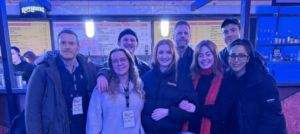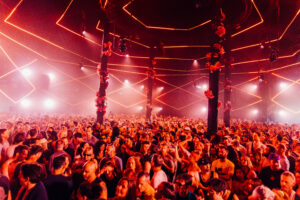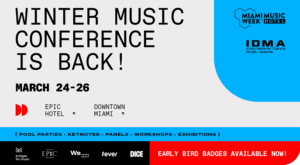This month, The Fair and We Are OPS teams ventured to Birmingham’s Hockley Social Club for the much anticipated Night Time Economy Summit – an annual conference that has become a staple in the diary of those within the music, festival, events and night time industries.
Hosted over two days, the summit invites industry leaders from across the world (we’re talking South America, Japan and even Australia) to share experiences and join conversations that will support independent culture.
Panels covered a vast range of topics, all of which are integral to the industry – from Queer spaces to youth culture, policy to partnerships, equality, accessibility and wellbeing.

Over on The Fair’s own Stage Takeover, guests enjoyed a programme of panels exploring some of the most important topics across the music, festival and events industry right now.
Key players from the fields and beyond shared new ideas and insights, identified growing trends, highlighted upcoming projects and opportunities, and explored real solutions addressing the issues impacting festivals in 2025.
While the team did their thing on Stage 4, OPS Advisor Sarah Meredith took the opportunity to hear insights from conversations on the day.
Here are some of her key takeaways…
- ‘Collaboration’ is the word of 2025
Sorry Collins, but ‘Brat’ is so last year…
Whether it be production costs, ticket sales, cancellations or fees, it’s been a tough time for everybody in the independent festival industry in recent years.
The Fair’s first panel explored ‘The Bottom Line: How do we keep independent festivals alive?’, discussing why – as well as cancellations – even independent festivals that are selling out are struggling to break even.
The general consensus is that headline artist fees are an issue for promoters, even though artists may not necessarily be the main pull for the next generation of festivalgoers (more data to come on this, watch this space…)
Tips for independent survival included curating festivals that sell out because of overall experience, mixing up roles in your business, exploring other funding and revenue streams, and thinking about not just your present audience, but your future one (let’s have honest conversations with our audiences – where would we be without them?)
These discussions continued into panel 2, where we invited, artists, promoters and managers to explore ‘Artists and promoters: How do we find the balance?’Artists are an integral part of any festival. But are headline artists doing enough to support festivals in these challenging times? And are promoters understanding the changing needs of the artist landscape?
Again, collaboration was deemed essential in 2025: there is power in numbers, and if we really nurture our collective knowledge, experience and talent, we can foster a community that will strengthen independent culture for years to come.
Off the back of this idea, we invited panel members to join a closed meeting after the panel to discuss ‘Let’s Talk’ – a new initiative we have created to make sure these vital conversations continue and make change.
Read more: Introducing ‘Let’s Talk’: A space to find solutions and secure the future of festivals
Ultimately, however, the conversation came back to fees as an element of collaboration required to make festivals work going forward.
2. Communication > Competition
This can determine the outcome of major incidents on site
‘Dealing with disaster’ is simply something you have to accept when it comes to building festivals – which is why we hosted a live table-top discussion to discuss how we go about things when we encounter the worst…
Chrissie Gilbert, a seasoned Event Controller and Site Manager, pointed out that those in the nighttime economy and festival realm are not in competition with each other, but ultimately share the same goals and should be working together to share best practice and knowledge.
The Control Room at a festival is a central hub where staff monitor various aspects of the event – from security to crowd flow, medical situations, stage operations and overall safety. This is where the decisions regarding how to respond to any issues are made.
There was discussion around how simply creating an appropriate room layout can impact decision making. Chief Inspector Steve Darroch from the Mo7 taskforce explained how – if the control room is not fit for emergency services to attend, or if the space is too small and there’s no seating – this can lead to miscommunication.
It goes to show just how much detail is required during both the planning and live stages of a festival.
To test our panel participants, The Fair’s Production Director Millie Devereux led a tabletop with a scenario. A train station which would have been the primary egress route for a day festival has been shut. What do we do as event professionals? It was interesting to see the different perspectives and how each of these functions work together when reacting to what may become a disaster event.
The main takeaway was the importance of fluid communication – not only between Event Liaison Team members, but also how information is relayed to the public. Having a clear command structure and agreement beforehand on how information is distributed keeps decision making concise and effective.
3. The Future is Technology
But don’t worry, AI won’t take all our jobs
Artificial Intelligence is everywhere – it would make sense for it make its way into festival planning and production. Thankfully it will not be taking our jobs just yet, but there were some questions around the use of technology within the industry…
Reshad Hossenally, CEO of Boxbar Tech gave a convincing counter perspective when challenged on automated bars reducing the opportunity for staff to work at events. Reshad fully took onboard the concerns of technology replacing job functions but gave the alternative; less expenses on bar staff meant money was able to be spent elsewhere that supported jobs on a whole in the industry. As mentioned, festivals for 2024 have struggled financially, now with the option of automating functions within the wider picture allows events to go ahead without eating into their margins.
Another interesting trend many hope to see develop is the use of technology in assessing crowd density and providing real time information. Head of Global Business Development & Growth for Event Tech Live, Fiona Wilson was able to share some exciting new technology that had safety at its core. There is now software that can provide real-time information as a ‘heat-map’ that can alert Event Control to areas of overcrowding, dispatch resources and prevent disasters before they begin. Tamzin Lent, CEO is currently at the forefront of this technology with Where You At, providing a mesh network and spatial crowd data analytics app, already proven to have help track hundreds of thousands of people in venues and festivals where there’s no signal or network. Tamzin suggested that the future of festivals could see this type of technology be implemented with traders to reduce queuing time and be used as a tool for managers to utilise staff better by placing them in high traffic areas. This would reduce pinch points and keep customers happy, and more importantly wanting to return year after year.
There was even the mention of AI being used to create event Whatsapp chats where information is all in one place and users able to ask it questions.
The topic of technology is so hot, that it seeped its way into a number of other panels.
Speaking on ‘Crowd Management: Evolving with the Times’, Jan Rankou, Senior Operations Manager for We Are OPS, highlighted the use of cameras on site. Not just for the obvious taking pictures for memories, but the use of CCTV, bodycams on security and cameras at access and egress points. They can provide event managers with vital information on crowd flow.
Alongside this, it’s also important to research as much as possible before an event, use surveys, ticket sellers, promoters as they can provide insight on the audience profiles and what to expect.
4. Collaboration spreads further than the UK festival field
Our community stretches globally – let’s tap into that
Our final panel, ‘Looking Beyond: Festival Insights from Across the World’invited professionals who take their expertise across the world – from Malta to Albania, Nashville to Saudi Arabia.
Brexit has of course caused challenges: artists who once were able to travel freely with large crews of international staff has made everything in the industry seem harder.
But Mainstage MD Alan Crofton noted how the festival industry is starting to blossom in other corners of the world – creating jobs and facilitating highly skilled staff to pursue careers that were not available to them previously. Some countries that once lacked the infrastructure are now hosting regular events with quality artists and loyal fans.
Language barriers may be a challenge on site, but it’s not stopping travellers from across the globe line-up at stage barriers in sunny locations across Europe and the Middle East.
Festivals abroad are able to fill hotels and flights during what used to be an off-season for many resorts, expanding the local economy and supporting other projects in the area.
Nick Mizzi of Defected Record supported the idea that festivals in the European market are able to book current and popular artists by working with artist managers, offering them slots at these lesser known locations as part of a wider tour. Yet the price of a ticket in these locations is much less than what you might expect to pay for an artist of high calibre elsewhere.
One key difference we were keen to explore is the support that is available in the UK compared to abroad. The Fair’s Production Manager Cornelia Hammarlund explained that when planning events like RecFest USA, you have to consider unions in your planning, as they play a much larger part over there than in the UK – though not all roles on a US site are unionised. Technical production roles, for example, are often unionised and therefore expect working hours to be strongly adhered to. If overtime is considered, it’ll be charged at a hefty rate. On the contrary, other roles on US sites are not unionised and often treated differently. Conditions onsite can be difficult compared to the UK.
We learn so much from each other in our close-knit industry, which is proven at events just like this. But discussing festivals across the globe proved just how much we can learn from our community further afield.
If you enjoyed reading about these insights, be sure to get in touch to find out more about the work The Fair is doing to champion independent culture this year, as well as the vast range of services we deliver to bring festivals and events to life.
With thanks to the fabulous folks who joined us at NTE Summit this year:
Caroline Clift (StandOut Magazine)
Jenn Nimmo-Smith (Electric Shores Publicity)
Fred Letts (Percolate & Waterworks Festival)
Sonny Wharton (Twelve Ten Talent)
Annie Chebib (UKCMA and Select Security and Stewarding Ltd)
Jan Rankou (We Are OPS / We Group)
Superintendent Phil Spurgeon (Greater Manchester Police)
Millie Devereux ( The Fair / We Group)
Chrissie Gilbert (Event Controller)
Pheobe Roberts (Attitude is Everything)
Cornelia Hammarlund (The Fair)
Jenni Cochrane (Getahead Festival)



